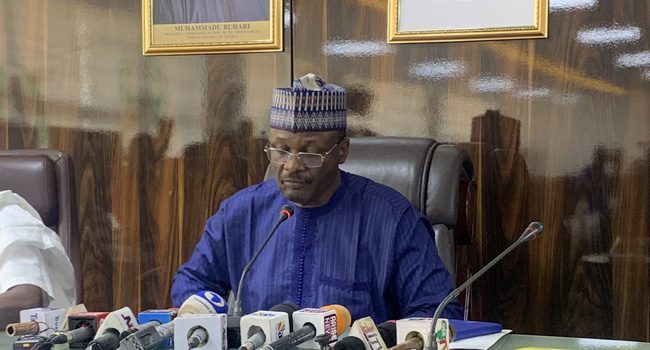Headlines
INEC ought to stop running religiously motivated campaigns in 2023

People have been hopeful that INEC will succeed in holding one of the most credible elections in Nigeria since the 2022 Electoral Act was signed.
Even the chairman’s warning that unrest might necessitate a postponement of the elections failed to alter the atmosphere. People are aware that he has no influence over this and that the commission is powerless to change it.
The commission has faced additional planning difficulties, but these problems are being resolved and can occur at any moment in any nation. INEC should pay attention to the fact that Nigeria’s political environment is becoming more and more divided along racial and religious lines.
All campaigning based on religion or tribe is prohibited by Section 97 of the 2022 Electoral Act. According to the law, any candidate, person, or organisation who engages in campaigning or broadcasting for a religious, tribal, or sectional reason to support or oppose the election of a particular candidate or political party commits an offence under this Act and is subject to punishment upon conviction of (a) a maximum fine of N1,000,000 or (b) in the case of a political party, a maximum fine of N10,000,000.
INEC has announced the collation site for the 2023 presidential election.
This is a problem because they are using a same-faith ticket to exploit the ruling party, the APC. Anyone may adopt a same-faith ticket legally, and this has happened in the past. Abiola and Kingibe ran on the SDP’s Muslim-Muslim ticket in the 1992 election that was later declared invalid. In the 1979 second republic election in Nigeria, there were two well-known Christian-Christian tickets before MKO’s candidature: Chief Awolowo with Philip Umeadi and Azikiwe of the NPP with Ishaya Audu. They both ran on a Muslim-Christian ticket to compete against the eventual winners, Shagari and Ekwueme.
In Kaduna, at the state level, the current trend of Muslim-Muslim tickets began in 2019. To gain an advantage over the state’s Muslim majority, the ruling party under El-Rufai devised a campaign to polarise voters. In Kaduna, the change from the traditional Muslim-Christian ticket to a Muslim-Muslim ticket has resulted in a higher level of community mistrust and instability. The ruling party has disregarded the repercussions despite several requests because they only care about winning the polls.
Politicians will undoubtedly consider a legal tactic to prevail despite fair representation. Given the data from Kaduna, where insecurity issues have worsened due to the polarised nature of voters across extreme religious lines, the reasoning behind the selection of these candidates, however, demonstrates that they are not concerned with the common benefit of the people. The lesson demonstrates that, despite being legal, the Muslim-Muslim ticket has not enhanced people’s quality of life.
Concerning signals have been given by the Muslim-Muslim ticket to Christian organisations like CAN. Many people expect that history will repeat itself and that the APC’s likely victory will result in the inclusion of the Christian faith. This was the case in 1979.
The Christian-polarized group’s implied solution is to adopt Peter Obi. Whether it was done on purpose or by accident, it was observed. Peter Obi was overheard pushing the congregation to get up and take back their country during one of his church trips. A pastor who was running for office in Plateau appeared to urge the populace to retake their nation. Although it should be a common message, Muslim groups interpret it as having a Zionist goal.
In response, Kano State Governor Ganduje rallied the Izala JIBWIS group to support the Muslim-Muslim ticket. A preacher was caught on camera claiming that a Muslim-Muslim ticket is preferable to a Muslim-Christian ticket and that the ticket itself is more important than the nation’s current economic problems. Voting for a Muslim-Muslim ticket is jihad, a cleric is heard saying in another video that is going viral, further inflaming mistrust among the community.
With claims of Zionist-like objectives, both religions are wary of one another. The anti-religion sentiment in the campaign is the same for all of them: clerics are pleading with their followers to adhere to their extreme viewpoints and vote according to religion. These religious leaders and elected officials are acting in violation of Section 97 of the 2022 Electoral Act because they are speaking for themselves and not for the sake of the community.
INEC should be able to hold individuals who broke the law accountable based on the fragments of video footage that are currently in circulation. The Electoral Act’s punishment does not appear severe enough, but if it is carried out, it will dissuade the offenders. Incredibly, INEC says nothing about this. Its lack of action suggests that it is either supporting it, unwilling to implement Section 97, or ignorant of what is taking place. Whichever it is, the commission will not be pleased. All the materials they require for the elections have been given to them.
The opposing parties have also expressed their worries. Peter Obi or Bola Tinubu may succeed by using the polarised religious radicals, which would be unjust to the parties that chose to play clean politics by debating issues rather than dividing people along religious lines.
In all seriousness, political parties have a chance to benefit from the politics of radical religion. Some choose to distinguish themselves from religious zealots by claiming moral superiority. The PDP and other traditional Muslim-Christian candidates may stand to gain from the divisions between the two communities. They have chosen not to adopt a religious supremacist stance, though.
Therefore, if security permits, INEC must enforce the law against those who do so in order to guarantee a free and fair election. Otherwise, Buhari’s tenuous legacy and the integrity of the institution are in jeopardy.
